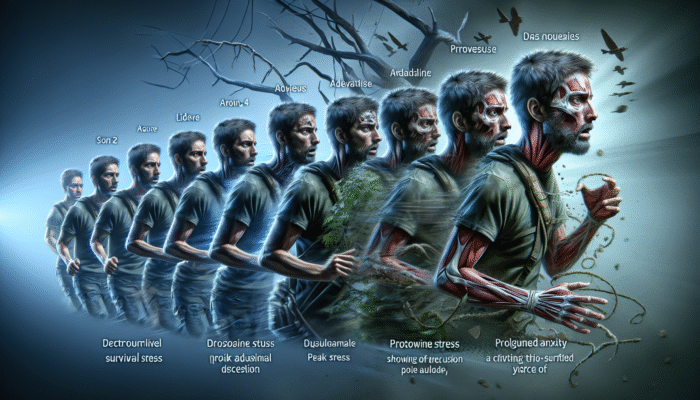Mastering Stress Management Techniques for Survival Situations
Implementing effective stress management strategies for survival is crucial, as stress is an inherent aspect of survival situations that greatly influences individual reactions during crises. A comprehensive understanding of the mechanisms of stress is essential to formulate effective stress management techniques. Stress can present itself in numerous forms, affecting both the physiological and psychological aspects of an individual’s health and overall quality of life. By recognising these aspects, individuals can be empowered to navigate the immense pressures that accompany survival scenarios more effectively.
Identifying the Varied Types of Stress in Survival Environments

In survival environments, various types of stress can emerge, particularly acute stress, chronic stress, and traumatic stress. Acute stress arises in response to immediate threats, such as a natural disaster or sudden injuries, triggering a swift physiological reaction. This reaction typically includes heightened alertness, increased heart rate, and an adrenaline surge, preparing the body for either fight or flight. While short episodes of acute stress can be advantageous, extended exposure can lead to chronic stress. Chronic stress can occur due to ongoing threats, such as prolonged isolation during survival situations or persistent concerns about rescue efforts, which can detrimentally impact both mental and physical health.
Traumatic stress may arise following the experience of life-threatening events or extreme survival challenges. Those grappling with traumatic stress can face enduring emotional difficulties, such as post-traumatic stress disorder (PTSD), which can disrupt daily life and hinder recovery. This underscores the urgent necessity of implementing effective survival stress management techniques to promote long-term health and resilience. Recognising these categories of stress equips individuals to tailor their coping strategies, significantly enhancing their chances of flourishing in adverse conditions.
Understanding the Body’s Stress Responses and Their Consequences
The body’s response to stress involves a sophisticated interplay of various systems, primarily governed by the autonomic nervous system. The fight-or-flight response epitomises the body’s instinctive reaction to perceived threats, wherein the hypothalamus instructs the adrenal glands to release adrenaline and cortisol. These hormones prepare the body for immediate action, resulting in increased heart rate, rapid breathing, and enhanced alertness. While these physiological responses are crucial for survival, they can also lead to several potential health complications.
Prolonged exposure to stress hormones can result in health issues, including hypertension, weakened immune responses, and digestive disorders. Grasping these physiological reactions is essential for effective stress management, as it enables individuals to identify when their bodies are overwhelmed by stress and to adopt strategies to alleviate these adverse effects. By being attuned to their physiological state, individuals can manage their stress responses more effectively, which is vital for maintaining optimal performance in high-pressure situations.
Awareness of one’s physiological condition empowers individuals to handle stress responses adeptly, which in turn enhances performance in critical scenarios, emphasising the necessity of managing these reactions effectively.
Assessing the Psychological Effects of Stress in Survival Contexts
The psychological ramifications of stress during survival scenarios are profound, impacting everything from decision-making processes to emotional stability. Environments characterised by intense stress can hinder cognitive functioning, resulting in confusion, indecisiveness, and panic. Such mental barriers can be detrimental in crisis situations where clear and rational thought is paramount for survival.
Individuals often grapple with emotions such as fear, isolation, and despair, which can cloud judgment and impede effective problem-solving. Recognising the psychological burden of stress is essential for successful stress management. Mental resilience can be fostered through practices such as mindfulness and stress-reduction techniques, which aid in preserving mental clarity even under pressure.
Furthermore, understanding group dynamics can enhance collective psychological resilience, elevate group morale, and improve communication. The mental component of survival is as critical as the physical, necessitating that individuals prioritise mental well-being within their survival strategies.
Developing Robust Coping Strategies for Effective Stress Management

To thrive in challenging situations, individuals must cultivate effective coping strategies for managing stress. Techniques such as deep breathing, meditation, and physical exercise can significantly lower immediate stress levels and promote overall well-being. For example, practising controlled breathing exercises can activate the body’s relaxation response, counteracting the adrenaline surge that accompanies acute stress.
Beyond immediate strategies, assembling a comprehensive toolkit for stress management that encompasses mental techniques is crucial. Visualization exercises can prepare individuals for potential challenges, instilling a sense of control and readiness. Equally significant is the establishment of a supportive network, allowing survivors to share their experiences and alleviate feelings of isolation.
Moreover, nurturing mental resilience through the regular practice of stress management techniques can bolster individuals’ capacity to cope with future challenges. The ability to identify and implement effective coping strategies is fundamental to successful stress management, enabling individuals to maintain focus and clarity in high-stress scenarios.
Preparing Your Mind for Survival Challenges
Mental preparation is a fundamental aspect of effective stress management. Cultivating mental resilience and refining coping strategies can significantly enhance one’s ability to confront dire circumstances.
Cultivating Mental Resilience for Success in Survival Situations
Mental resilience refers to the capacity to adapt to adversity, trauma, and stress, making it vital for successful survival. Strategies to foster resilience include adopting a growth mindset, which encourages individuals to learn from challenges instead of perceiving them as insurmountable obstacles. Engaging in activities that push personal comfort limits, such as outdoor excursions or team-based challenges, can fortify mental strength.
Additionally, incorporating daily practices of self-reflection or journaling can assist individuals in processing their emotions and thoughts, facilitating navigation through stressful experiences. Resilience is not solely about surviving stress; it’s about thriving in its presence.
Regular engagement in scenarios that demand problem-solving and adaptability can greatly enhance confidence in crisis management. It is essential for individuals to mentally prepare for the unpredictability inherent in survival situations, developing a robust mental toolkit to support effective stress management during survival.
Utilising Visualization and Mental Rehearsal Techniques for Preparation

Visualization and mental rehearsal are powerful techniques employed across various high-stakes fields, from sports to military training, and can be particularly effective in preparing for survival situations. By vividly imagining oneself navigating potential survival scenarios, individuals can create mental pathways that facilitate quicker decision-making during real emergencies.
For instance, envisioning a scenario where one must locate water or construct a shelter can enhance problem-solving abilities and reduce panic. Engaging all senses—sight, sound, and even smell—during mental imagery can create a more immersive experience, solidifying these essential survival skills in an individual’s mind.
Consistent practice of these techniques can lead to heightened confidence and preparedness, rendering them invaluable tools in the realm of survival stress management. When confronted with real-life challenges, individuals who have practised visualization may respond more adeptly and calmly, drawing upon their mental rehearsals to inform their actions.
Maintaining an Optimistic and Positive Mindset for Resilience
Embracing an optimistic mindset is vital for navigating survival situations, serving as a protective barrier against the debilitating effects of stress. Cultivating a sense of optimism can enhance problem-solving abilities, boost morale, and strengthen resilience. Strategies to uphold a positive outlook include gratitude practices, where individuals focus on what is functioning well, even in challenging circumstances.
Additionally, reframing negative thoughts into constructive perspectives can transform perceptions of stress. For instance, viewing a challenge as an opportunity for growth rather than a threat can significantly alter emotional responses and decision-making processes.
Engaging in positive social interactions can further support a hopeful perspective. Communicative encouragement within a group fosters an environment where positivity flourishes, which is crucial for effective stress management.
Ultimately, sustaining an optimistic mindset can enhance not only individual responses but also group dynamics, contributing to overall success in survival scenarios.
Implementing Effective Strategies to Manage Stress and Anxiety
Proficiently managing stress and anxiety is paramount in survival scenarios, where clear thinking is essential. Techniques such as mindfulness and grounding exercises can assist individuals in remaining present and focused, alleviating the overwhelming emotions that often arise in high-pressure environments.
Practising mindfulness involves observing thoughts and feelings without judgment, fostering a sense of calm amidst chaos. Grounding techniques—such as focusing on physical sensations or counting backwards—can help redirect anxious energy into manageable strategies.
Furthermore, establishing a routine—even in unpredictable conditions—can cultivate a sense of normalcy that aids in stress reduction. Simple actions like setting daily goals or maintaining a consistent sleep schedule contribute to emotional stability and clarity.
By integrating these practices into their survival toolkit, individuals can substantially enhance their ability to manage stress and anxiety, ensuring they remain composed and capable of making sound decisions during critical moments. This proactive approach to survival stress management can significantly improve outcomes in high-pressure situations.
Acquiring Practical Skills for Effective Stress Management
Developing practical skills for survival stress management empowers individuals to navigate challenging situations with greater efficiency and confidence. These skills encompass both physical techniques and strategic methods.
Employing Breathing Techniques to Cultivate Calmness
Breathing techniques serve as a powerful tool for managing stress, enabling individuals to regain composure in overwhelming circumstances. Simple exercises such as diaphragmatic breathing can significantly alleviate anxiety and promote relaxation by enhancing oxygen flow and activating the body's natural calming response.
For example, the 4-7-8 technique—inhale for four counts, hold for seven, and exhale for eight—can induce a state of tranquillity within minutes. Regular practice of these techniques can facilitate their automatic application during high-stress moments, allowing individuals to remain centred.
Moreover, concentrating on breathing diverts attention from stressors, helping individuals clarify their thoughts and subsequent actions. Establishing a routine that incorporates these practices can greatly enhance one’s ability to manage stress effectively in survival scenarios, ultimately supporting improved decision-making and emotional regulation.
Maximising the Advantages of Physical Activity for Stress Relief
Participating in physical activity is an excellent remedy for stress, providing both physical and psychological advantages. Engaging in exercise releases endorphins, neurotransmitters that foster feelings of happiness and relaxation. In survival situations, even moderate physical activities—such as walking or stretching—can help alleviate anxiety and elevate mood.
Regular physical exertion also enhances fitness levels, which is crucial in survival contexts. Increased stamina and strength improve an individual’s capacity to navigate challenging environments, fostering a sense of control and confidence.
Additionally, incorporating movement into daily routines can serve as a natural stress reliever. Activities that blend physical exertion with mindfulness, such as yoga or tai chi, can further amplify stress-reduction benefits, creating a holistic approach to stress management.
Ultimately, prioritising physical activity not only enhances mental health but also equips individuals with the resilience necessary for survival.
Mastering Time Management and Prioritisation Skills to Alleviate Stress
Effective time management and the prioritisation of tasks are indispensable skills for minimising stress and maximising efficiency in survival scenarios. In high-pressure environments, the ability to evaluate tasks and allocate time effectively can significantly enhance the prospect of success.
Establishing a clear hierarchy of needs—such as shelter, water, and food—enables individuals to concentrate on immediate priorities, alleviating feelings of overwhelm. Formulating actionable plans and breaking larger tasks into manageable steps can transform seemingly daunting challenges into achievable objectives.
Moreover, scheduling regular intervals for breaks can help mitigate stress, providing opportunities for individuals to recharge both physically and mentally. By implementing structured time management strategies, individuals can streamline their efforts, ensuring they remain focused and effective in their survival endeavours, thereby reinforcing their survival stress management capabilities.
Understanding the Importance of Social and Emotional Support Systems in Stress Management
Social and emotional support systems are crucial for effective stress management. The presence of others can significantly impact how individuals cope with stress, providing both tangible assistance and emotional reassurance.
The Significance of Companionship in Survival Scenarios
Companionship offers vital emotional support in survival situations, fostering a sense of connection and reducing feelings of isolation. Sharing experiences and burdens with others can alleviate stress, as social interaction is known to release oxytocin, a hormone associated with bonding and stress reduction.
In survival contexts, companionship can also enhance resourcefulness, enabling individuals to collaborate and combine their skills and knowledge to address challenges more effectively. The camaraderie that develops in these scenarios can uplift morale, making it easier to endure hardships.
Furthermore, companionship facilitates communication, allowing groups to navigate complex social dynamics that may arise. By fostering a supportive environment, individuals can collectively manage stress more effectively, thereby improving their overall well-being and increasing their chances of survival.
Improving Group Cohesion through Effective Communication Under Stress
Clear communication is essential for maintaining group cohesion and morale in survival situations. During stressful periods, misunderstandings are likely to occur, leading to heightened tension and potential conflicts.
Developing effective communication skills can significantly enhance group dynamics, promoting cooperation and collaboration. Techniques such as active listening, where individuals fully engage with one another, can create an atmosphere of trust and understanding.
Additionally, establishing clear roles and responsibilities within a group can streamline decision-making processes, reducing confusion during critical moments. By prioritising effective communication, groups can mitigate the adverse effects of stress, thereby bolstering their ability to manage stress and collaborate on problem-solving.
Building Trust and Encouraging Teamwork in Survival Contexts
Trust and teamwork are foundational elements for efficient survival strategies. In high-stress environments, trusting relationships foster collaboration, enabling individuals to work together seamlessly toward shared goals.
Establishing trust necessitates open communication and shared experiences, creating a strong foundation for teamwork. Engaging in team-building activities in low-stress situations can help build rapport and familiarity, facilitating cohesive operations during survival scenarios.
Additionally, recognising and valuing each member’s unique strengths can enhance group effectiveness, allowing individuals to contribute in ways that align with their specific skills and experiences. By fostering trust and teamwork, groups can significantly improve their ability to manage stress and enhance their survival chances, highlighting the importance of social support systems in stress management.
The Essential Role of Nutrition and Hydration in Successful Stress Management
Nutrition and hydration are fundamental components of effective stress management during crises, influencing both physical health and emotional well-being.
The Influence of Nutrition on Stress Management
Proper nutrition is vital for regulating stress levels and sustaining energy throughout challenging situations. Nutrient-rich foods can enhance cognitive function and emotional stability, which are essential when facing adversities.
For instance, complex carbohydrates, such as whole grains, can elevate serotonin levels, a neurotransmitter crucial for mood regulation. Furthermore, incorporating a variety of fruits and vegetables provides essential vitamins and minerals that support overall health, enabling individuals to cope more effectively with stress.
Conversely, diets high in sugar and processed foods can worsen stress responses and contribute to fatigue. Understanding the correlation between nutrition and stress management empowers individuals to make informed dietary choices that enhance both their mental and physical resilience in survival situations.
The Importance of Hydration in Managing Stress Responses
Maintaining adequate hydration is essential for optimal bodily functions, particularly in stressful environments. Dehydration can lead to fatigue, confusion, and irritability, all of which can elevate stress levels.
Ensuring sufficient water intake supports cognitive function and energy levels, allowing individuals to think clearly and make sound decisions. In survival scenarios, prioritising access to clean water is paramount, and individuals should remain vigilant regarding their hydration needs, especially during physically demanding tasks.
Moreover, consuming hydrating foods—such as fruits and vegetables—can enhance overall hydration strategies. A focus on hydration not only promotes physical health but also supports effective stress management, enabling individuals to stay alert and resilient in challenging environments.
Making Thoughtful Food Choices in Survival Contexts
Making informed food choices in survival situations can significantly affect both mental and physical health. When resources are limited, selecting nutrient-dense foods becomes crucial for maintaining energy levels and cognitive function.
Options such as nuts, seeds, and dried fruits provide excellent sources of energy and essential nutrients. Learning to identify edible plants and foraging can enhance food security in wilderness survival scenarios, ensuring necessary sustenance.
Furthermore, understanding the significance of protein in preserving muscle mass and promoting satiety is vital. Including protein sources, whether animal-based or plant-derived, helps stabilise blood sugar levels and can improve mood, contributing to effective survival stress management.
By prioritising smart food choices, individuals can strengthen their physical and mental resilience, enhancing their overall survival strategies.
Meal Timing and Its Impact on Stress Reduction
The timing of meals can greatly influence stress levels and overall well-being. Regular meal timings help stabilise energy levels and mood, preventing irritability often associated with hunger.
Establishing a routine that incorporates meals at consistent intervals can create a sense of normalcy and predictability, particularly advantageous in unpredictable survival scenarios. Additionally, regular meals help maintain balanced blood sugar levels, alleviating feelings of anxiety and supporting cognitive function.
Being mindful of meal timing not only promotes physical health but also contributes to emotional stability, making it a crucial aspect of survival stress management. When individuals feel physically secure, they are better equipped to confront the mental and emotional challenges that arise in survival situations.
Identifying Nutrients That Assist in Combatting Stress
Certain nutrients play a pivotal role in alleviating stress and enhancing mental well-being. For example, magnesium has been shown to reduce anxiety levels and improve mood. Foods rich in magnesium, such as leafy greens, nuts, and seeds, are valuable additions to a survival diet.
Omega-3 fatty acids, found in fatty fish and flaxseeds, are renowned for their anti-inflammatory properties and cognitive benefits. These nutrients support brain health and can mitigate the impacts of stress, rendering them essential for individuals facing survival challenges.
Additionally, B vitamins are crucial for energy metabolism and cognitive function, underscoring the importance of a balanced diet in managing stress effectively. By incorporating these vital nutrients into their diets, individuals can improve their ability to manage stress and bolster their resilience in the face of adversity.
Implementing Sustainable Strategies for Stress Management and Recovery
Establishing sustainable stress management and recovery strategies is essential for maintaining overall well-being following survival situations. Recognising and addressing the lingering effects of stress empowers individuals to rebuild and thrive.
Identifying Symptoms of Chronic Stress
Recognising the signs of chronic stress is vital for effective recovery. Common symptoms include fatigue, irritability, and difficulties with concentration. These manifestations can persist long after the stressful event has concluded, adversely impacting daily functioning and overall quality of life.
Awareness of these signs enables individuals to take proactive measures toward recovery, such as seeking professional assistance or engaging in self-care practices. Notably, chronic stress can manifest physically, leading to health complications.
Developing acute awareness of one’s emotional and physical state is essential for initiating the healing process and enhancing long-term stress management capabilities.
Utilising Techniques for Post-Survival Recovery
Post-survival recovery encompasses both mental and physical healing. Techniques such as debriefing—reflecting on the experience with trusted individuals—can facilitate emotional processing and resilience building.
Engaging in restorative activities, such as yoga or meditation, fosters relaxation and enhances emotional clarity. Additionally, establishing a routine can reintroduce stability into daily life, fostering a sense of normalcy and control.
Nutrition also plays a critical role in the recovery journey. Emphasising nutrient-dense foods boosts physical health and mental resilience, creating a holistic approach to recovery. By integrating these techniques into their recovery process, individuals can strengthen their long-term survival stress management strategies and emerge more resilient from their experiences.
Reintegration and the Importance of Support Networks
Reintegrating into everyday life following a survival experience can present significant challenges. Leveraging support networks, such as friends, family, or therapy groups, can provide essential emotional backing during this transition.
These networks foster a sense of belonging and understanding, alleviating feelings of isolation and loneliness. Engaging with others who have faced similar challenges can facilitate healing, providing a platform for shared experiences and coping strategies.
Moreover, establishing new routines that incorporate healthy coping mechanisms can be beneficial during the reintegration process. By prioritising community and support, individuals can enhance their overall resilience and fortify their survival stress management strategies.
Cultivating Resilience for Future Challenges
Developing resilience for future challenges involves adopting proactive strategies to prepare for potential stressors. This may include continuing to refine coping mechanisms, enhancing problem-solving skills, and maintaining physical fitness.
Regular practice of mindfulness and stress-reduction techniques can help individuals remain grounded during adversity. Furthermore, engaging in lifelong learning—whether through wilderness survival courses or emotional intelligence training—can empower individuals with the skills necessary to navigate future challenges effectively.
By concentrating on resilience development, individuals can improve their ability to manage stress, ensuring they are well-equipped to confront life’s uncertainties with confidence and strength.
Frequently Asked Questions (FAQs) about Stress Management in Survival
What does survival stress management entail?
Survival stress management encompasses various techniques and strategies aimed at assisting individuals in coping with and alleviating stress during high-pressure survival situations, ultimately enhancing their chances of survival and overall well-being.
What types of stress are associated with survival?
The primary categories of survival stress include acute, chronic, and traumatic stress, each exerting distinct effects on an individual’s physiological and psychological responses.
How can I enhance my mental resilience?
Improving mental resilience involves cultivating a growth mindset, engaging in challenging activities, practising mindfulness, and nurturing supportive relationships that foster emotional strength.
What coping strategies are effective for managing stress?
Effective coping strategies for stress include deep breathing exercises, regular physical activity, effective time management, social support, and techniques that promote positive thinking.
Why is proper nutrition crucial for stress management?
Proper nutrition regulates energy levels and mood by providing essential nutrients that enhance cognitive function and emotional stability, thereby supporting comprehensive stress management.
How does hydration influence stress levels?
Adequate hydration is vital for maintaining energy and cognitive function; dehydration can lead to fatigue and irritability, thereby exacerbating stress responses.
What role does social support play in survival situations?
Social support provides emotional comfort and practical assistance during challenging times, significantly enhancing coping capabilities and fostering resilience.
What are common indicators of chronic stress?
Common indicators of chronic stress include persistent fatigue, irritability, concentration difficulties, and physical symptoms such as headaches or digestive issues.
How can I successfully reintegrate into normal life following a survival experience?
Reintegration can be facilitated through utilising support networks, establishing new routines, engaging in restorative practices, and seeking professional help when necessary.
What strategies can I employ to build resilience for future challenges?
Building resilience involves continuous learning, practising stress-reduction techniques, maintaining physical fitness, and fostering supportive relationships to prepare for potential stressors.
Discover more insights on our platform at X!
The post Survival Stress Management: Essential Techniques appeared first on Survival Bite.
The Article Survival Stress Management Techniques You Need to Know Was Found On https://limitsofstrategy.com

